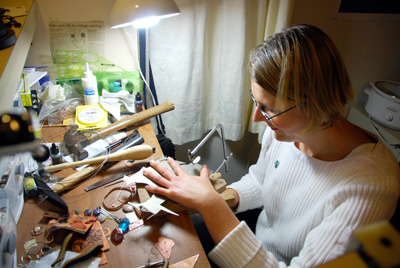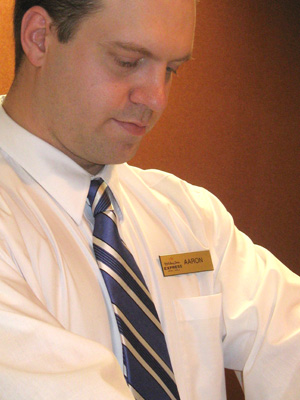Cancel My Reservation

In her free time, Judy Wand makes jewelry at a workbench in her apartment. She is an administrative assistant at Ball State University.
Photo by Stephen Smith
It's easy to wonder why Aaron and Judy Wand stay in a place like Muncie, Indiana. The dreary job prospects in this rustbelt town have convinced them they can't afford children.
Their friends have all left. But they stay because they like the people they've met through the Unitarian Church. And it's cheaper to live here than in places where job prospects might be better.
Both are native Hoosiers. Aaron grew up in nearby Kokomo, a town of 45,000. Judy's folks and brother still live on the family farm a few hours away. Judy came to attend Ball State University. Aaron came because he couldn't find work in Kokomo. He found a job he liked driving a forklift for a home-improvement store. Both expected to live at least as well as their parents. But, at the moment, the economic horizon looks as flat as the Indiana landscape.
"There's something they had then that we don't have now," Judy says of her parents' generation: plenty of good jobs. "You could be qualified for jobs with less education."
When the sociologists Robert and Helen Lynd studied Muncie in the 1920s and 30s for their seminal "Middletown" books, they detailed just how deeply a job and career mattered to modern Americans. The Lynds wrote: "One's job is the watershed down which the rest of one's life tends to flow in Middletown. Who one is, whom one knows, how one lives, what one aspires to be…are patterned by what one does to get a living and the amount of living this allows one to buy."
Judy is an administrative assistant at Ball State. Her job at the College of Architecture pays about $30,000 a year. She can afford the health insurance premium for herself but not for Aaron. In her spare time she makes jewelry at a small bench in their two-bedroom apartment. She sells some of her work in local shops and on the Internet .

Aaron Wand is night auditor at the Holiday Inn Express in Muncie.
Photo by Stephen Smith
Aaron works the night desk at the Holiday Inn Express on Muncie's main commercial strip. He's grateful to have a job in this economy, even though it pays just $14,000 a year and offers few benefits. He was manager at the home improvement store, but he lost that job in the last recession. His work life is a far cry from his parents.' Both worked at a unionized Delco battery factory in Kokomo that paid a middle-class income and good benefits, including health insurance and a pension.
The Wands are caught up in economic forces that extend beyond America's industrial Midwest. For much of the 20th century, Muncie thrived with well-paying jobs at the Ball Brothers Glass Manufacturing Company (think home canning), Indiana Steel and Wire, and at several large factories that made auto parts. Many workers came from poverty in Appalachia. Young men (and later women) had the opportunity to leave the farm for a life in the middle class.
In the '70s, manufacturing jobs started leaving for cheaper sites in the Sunbelt, and later succumbed to intense competition from emerging markets like Mexico and China. All of Muncie's big factories are now shuttered. The major employers are Ball Memorial Hospital and Ball State University.
"For some of the jobs at Ball State they want you to have a higher education than you really need," Judy says. As the biggest game in town, Ball State can impose high standards for its employees. Judy says she's making as much as anyone can with only a bachelor's degree. She'd have to get an M.A. to be on the "professional" track. Those jobs pay more, but Judy's unwilling to take on more student debt.
Debt looms large in the Wand's financial life just now.
Aaron and Judy are like two sides of a balance sheet. He's the spender; Judy saves. Aaron's credit card bill hovers around $10,000 - more than half his yearly income. They're whittling away at their debt. Aaron pays $225 a month on one card's balance; he pays the other off right away. Judy covers groceries, cable and the phone. The rest goes toward her $30,000 student loan.
They live modestly. They get by. Aaron seems at peace with their situation, saying their life is "comfortable." Judy seems more resigned. Life growing up on the farm was never easy.
"I grew up thinking that the glass was always half empty, because it always was for my family," she says.
Judy and Aaron have been married for a year. She has always wanted kids but Aaron is far less enthusiastic. Money - or lack of it - decided the question for them.
Back during the Great Depression, the Lynds noted a drop in Muncie's birthrate. In this way, Judy and Aaron Wand's decision not to have kids is a modern instance of an historical trend: in economic hard times, Americans have fewer kids.
"I don't think we're in a position to afford it," Judy says. "There's just not the foundation out there to build on," adds Aaron.
Back to Hard Times in Middletown.

